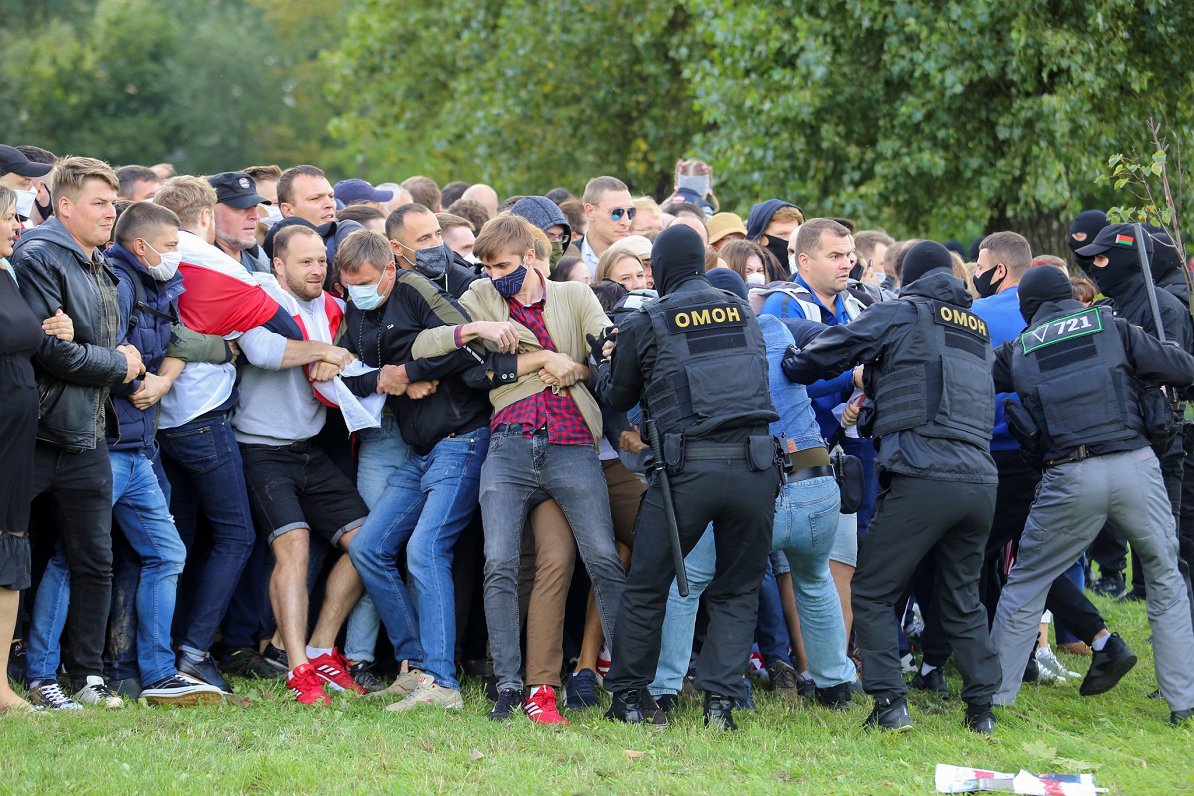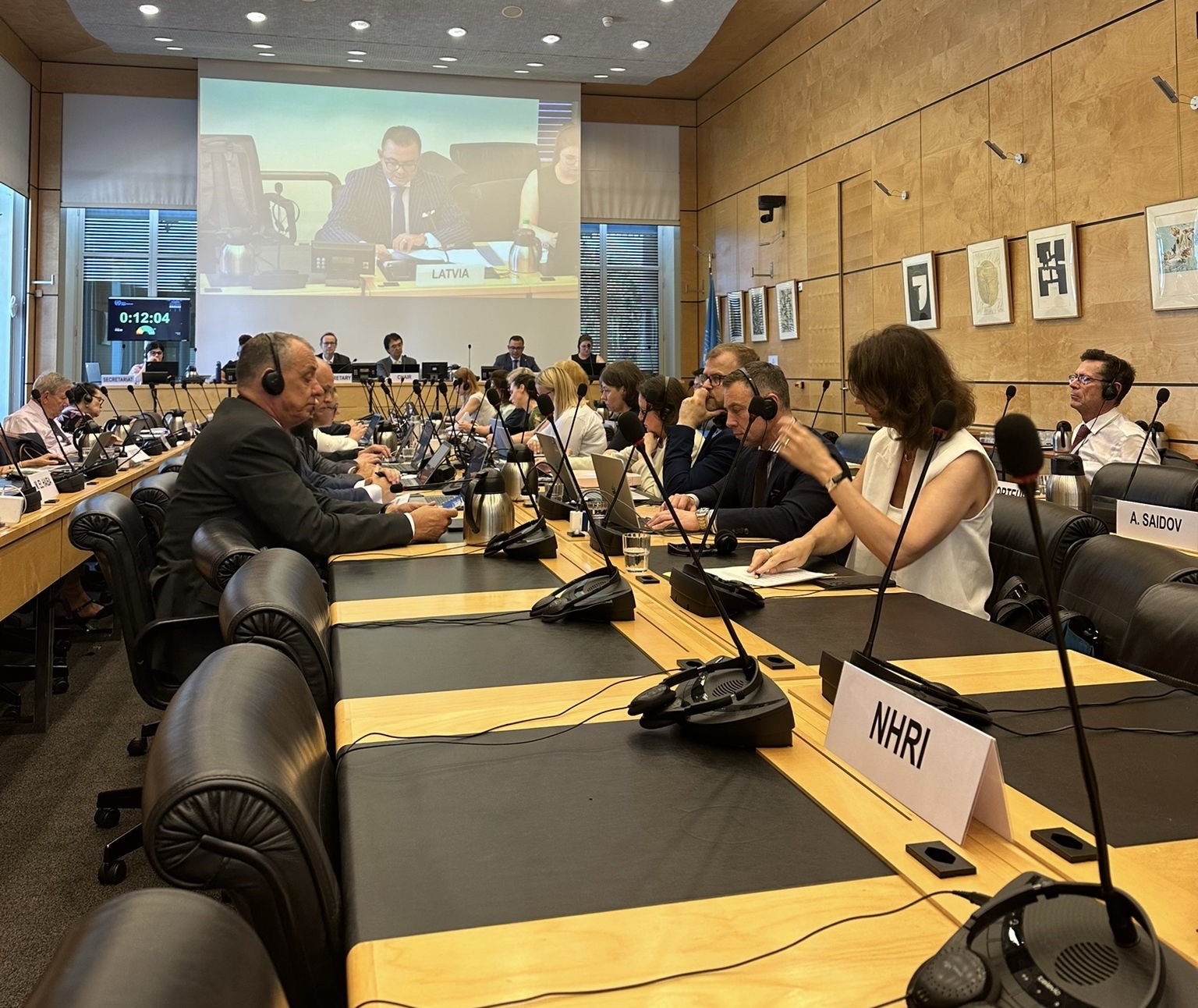From diversity to State accountability: The Committee calls on Latvia to act on discrimination
Published on 24 Jul 2025, 01:34 PM
The fourth periodic report of Latvia was reviewed on July 2025 by the Human Rights Committee
 Author: REUTERS, TUT.BY
Author: REUTERS, TUT.BY
On 1 and 2 July, the Human Rights Committee examined Latvia’s fourth periodic report on the implementation of the International Covenant on Civil and Political Rights (ICCPR). The Committee engaged in a robust and, at times, pointed dialogue with an exceptionally diverse and high-level Latvian delegation. The delegation was notable for its size, gender balance, and the breadth of ministerial representation, with key ministries, including those responsible for justice, health, foreign affairs, and internal affairs, directly present.
Many women held prominent roles within the delegation, and leadership diversity was further underscored by the presence of Mr. Hosams Abu Meri, former Minister of Health and recently appointed Ambassador to the United Nations in Geneva. Mr. Abu Meri, of Arab origin, stressed during the dialogue that his personal trajectory served as an example of Latvia’s openness to minority integration and the accessibility of high-ranking public functions to individuals from diverse backgrounds.
In a rare and striking opening, Latvia framed its human rights record within the broader geopolitical environment, emphasizing the repercussions of Russia’s war against Ukraine. Latvia highlighted regional instability and security risks posed by Russia as critical factors shaping domestic policies. The delegation repeatedly underscored Latvia’s EU membership as both a source of protection and a normative framework, reaffirming its commitment to EU values, the rule of law, and shared human rights obligations.
Throughout the session, Latvia’s EU membership was invoked not only as a legal reference point but as a moral and strategic framework. The Committee acknowledged this alignment but also warned that commitment to EU norms must translate into tangible rights protections, particularly at borders and in anti-corruption policy implementation.
Prison conditions: deaths in detention and allegations of torture under scrutiny
Committee members questioned the Latvian delegation over 141 reported deaths in prison between 2020 and 2024, as flagged by the Ombudsman. They sought clarification on whether these were suicides or due to other causes, and insisted on receiving the outcomes of any investigations. The Committee further inquired about steps taken to prevent similar incidents, particularly in psychiatric institutions, and allegations of informal prisoner self-governance. Despite existing safeguards, the Committee expressed concern regarding the revision of the national definition of torture, the lack of a fully operational National Preventive Mechanism (NPM), and demanded disaggregated statistics on complaints of torture and ill-treatment. It also pressed for psychological services to be available in all detention centers.
In response, the Latvian delegation noted new oversight tools: recorded police interrogations (except for juveniles), expanded use of body-worn cameras, and legal aid evaluated by a new Advocate Council to strengthen judicial independence.
Combating corruption and ensuring accountability
The Committee explored Latvia’s anti-corruption architecture in depth, acknowledging positive developments such as the Corruption Prevention and Combating Action Plan 2023–2025 and the recent launch of criminal proceedings. However, concerns remained about the persistence of corruption, particularly in the public sector, and the significant overlap of mandates among anti-corruption bodies. Delegation figures included 18 new criminal cases initiated by the Corruption Prevention and Combating Bureau (KNAB) in 2025, with 15 under prosecution and 88 pending in court.
The Committee emphasized the risks of fragmented mandates and the need for effective centralization under KNAB. It raised specific concerns about the postponement of the Interest Representation Register and Declaration Systems—from 2025 to 2028—despite being mandated under the 2023 Law on Transparency of Interest Representation. Experts urged Latvia to ensure that all allegations of corruption are thoroughly investigated and prosecuted, with appropriate reparations for victims. They also called for greater coordination between oversight mechanisms and a clear strategy to eradicate structural corruption in public institutions.
Human trafficking, asylum, border guard accountability and pushbacks

The Committee scrutinized Latvia’s handling of migration, asylum seekers, and human trafficking, particularly in the aftermath of the conflict in Ukraine. Grave concerns were raised about pushbacks and human rights violations at the Belarusian border between 2021 and 2023, including allegations of beatings, electric shocks, and denial of basic needs. The Committee warned that Latvia’s emergency legislation permitted de facto derogations from Covenant obligations without following formal procedures under article 4.
The Latvian delegation confirmed cooperation with EU experts on border guard training and reiterated that all unaccompanied minors receive legal assistance. However, the Committee was critical of the continuing legal loopholes allowing summary returns and insufficient access to asylum procedures. It urged Latvia to ensure compliance with the principle of non-refoulement at all times and to allow independent monitoring of border and detention facilities. Legal aid should be guaranteed for all stages of the asylum process, including judicial review of detention extensions.
Watch the review session again here (day 1) and here (day 2).
Disclaimer: Transcripts of the dialogue available here powered by WIPO Speech-to-Text served as the main source of the presented article and content was also generated with the assistance of artificial intelligence. While all the information was carefully checked, please refer to the audio or UN WebTV for an official version of the dialogue.
Recommendations of the Human Rights Committee
The Concluding Observations on Latvia's fourth periodic report were released on 18th July 2025. The State party is requested to provide, by 18th July 2028, information on the following recommendations (summarized):
Violence against women
The State party should:
- (a) Establish effective mechanisms and take necessary measures to encourage reporting of gender-based violence, including by informing all women and girls of their rights, protection, and remedies, while preventing stigmatization and revictimization;
- (b) Ensure all cases of violence against women and girls are promptly and thoroughly investigated, perpetrators prosecuted, and, if convicted, appropriately punished;
- (c) Guarantee victims access to effective remedies, protection, and support, including specialized centres and shelters nationwide, and raise awareness of these services;
- (d) Strengthen investigative and judicial capacity by training relevant professionals in gender-sensitive responses to gender-based violence and increasing the number of female prosecutors and police officers.
Prohibition of torture and other cruel, inhuman or degrading treatment or punishment, of persons deprived of their liberty
The State party should take all necessary measures to prevent and eliminate torture and other cruel, inhuman or degrading treatment or punishment. In particular, it should:
- (a) Revise its legislation to include a definition of torture fully aligned with article 7 of the Covenant and article 1 of the Convention against Torture, and ensure penalties reflect the gravity of the crime;
- (b) Conduct thorough, independent, and impartial investigations into all allegations of ill-treatment in custody and excessive use of force by law enforcement, in accordance with the Istanbul Protocol; prosecute and, if convicted, appropriately sanction perpetrators, and ensure full remedy and rehabilitation for victims;
- (c) Strengthen oversight mechanisms to prevent and punish excessive use of force by law enforcement;
- (d) Expand training for judges, prosecutors, law enforcement, and health professionals on international human rights standards, including the Méndez Principles;
- (e) Ensure all detainees have access to an independent, secure, and effective complaint mechanism for torture and ill-treatment, and protect complainants.
Treatment of aliens, migrants, refugees and asylum-seekers
The State party should guarantee access to territory and fair asylum procedures for all in need of international protection, while upholding the principle of non-refoulement at all times. It should also:
- (a) Investigate pushbacks and border abuses, punish offenders, and provide reparations to victims;
- (b) Train border and relevant officials on refugee rights, non-refoulement, and identifying vulnerable individuals;
- (c) Ensure independent oversight of borders and immigration detention;
- (d) Use asylum-seeker detention only as a last resort, keep it brief, and provide legal aid throughout the process.
Here, you can find all the recommendations given by the Committee in the Concluding Observations.
The follow-up report of Latvia on the implementation of recommendations is due in 2028. The next list of issues will be adopted in 2031, and the next periodic report is due in 2032.
 Author: REUTERS, TUT.BY
Author: REUTERS, TUT.BY


